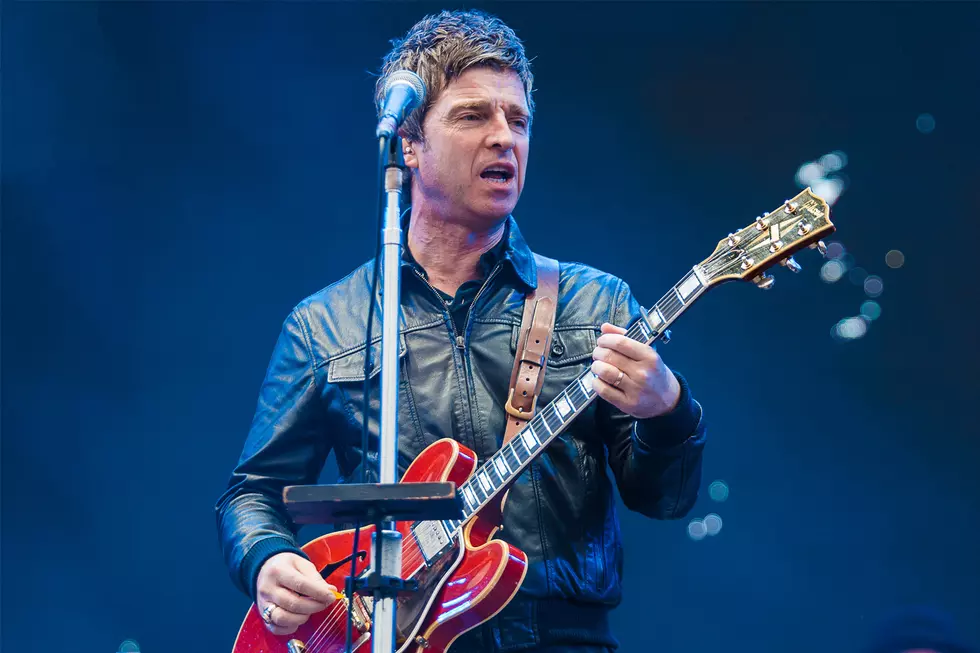The Story of Oasis’ ‘Definitely Maybe’
Oasis’ debut, Definitely Maybe, is the most important British album of the '90s.
Sure, there are scads of U.K. records you could make that argument for -- Blur’s Parklife, Radiohead’s The Bends or OK Computer, Robbie Williams’ Life Thru a Lens -- but none had the same instantaneous effect on rock music as Definitely Maybe, released on Aug. 29, 1994.
Although Oasis are often accused of being derivative, that's kind of the point. These Manchester lads brought minimalism back at a time when U.K. bands had been using and abusing keyboards, outlandish guitar effects, plastic vocals and drum machines.
That's the back-story in Britain. In America, Maybe arrived in the midst of grunge, which saw some seepage into the U.K. mix via bands like Northern Ireland’s Ash and two Oxford-based outfits: Radiohead (especially on their debut, Pablo Honey) and Supergrass I Should Coco. The Stone Roses’ 1989 self-titled album may have marked the beginning of a new era, but Oasis’ Definitely Maybe rang in the Britpop age.
In a 1995 interview with the NME, Oasis lead songwriter and guitarist Noel Gallagher described Definitely Maybe as "a bit one-dimensional, everything was the same tone.” Indeed, everything was cranked up to 10, but therein lies the magic. Rock 'n' roll music will always "come back" after fads lead listeners away from guitar, bass and drums. (It likely won't be long before the post-Mumford and Sons revival.) Key Definitely Maybe tracks "Live Forever" and "Supersonic" are four-chord anthems with simple sing-along choruses. When the solos come in, they're just right for air guitar.
For British audiences, Oasis songs represent those moments of zen amid one’s fourth or fifth pint at the local pub, when everyone gets together and sings in a unified, lager-drenched voice. For Americans, Oasis were a breath of fresh air after the first wave of slacker grunge and around the same time as next wave of albums: Weezer’s blue album, Green Day’s Dookie, Soundgarden’s Superunknown, the Offspring’s Smash and Alice in Chains' Jar of Flies. There was no gimmick, it was just pure, unadulterated rock 'n' roll.
Even so, critics and naysayers have argued that Oasis are no better than the sum of their highly derivative parts. You could argue, for instance, that opening cut, "Rock ‘N’ Roll Star," is just the Byrds’ "So You Wanna Be a Rock and Roll Star" updated with a bit more British braggadocio. (“You’re not down with who I am / Look at you you’re all in my hand tonight.”) On "Cigarettes & Alcohol," meanwhile, Oasis blatantly nick the opening of T. Rex’s "Get It On," if not the Hollies’ "Long Cool Woman (In a Black Dress)."
Oasis' originality further came into question when the band was successfully sued for lifting the melody on their single "Shakermaker" from the New Seekers' "I’d Like to Teach the World to Sing (In Perfect Harmony)." But “being derivative” is flimsy criticism. At its best, rock 'n' roll has always been about taking the last guy’s stuff, keeping the best parts, burning the rest to the ground and building your own temple in its ashes. Time and time again, this has been the case -- whether it be Big Star or R.E.M., the Strokes or Kings of Leon. And that's to say nothing of classic bands like the Rolling Stones, who owe their sound almost wholly to the Chicago bluesmen of the past.
It’s amazing to think that in a year that also saw Weezer's debut and Nirvana’s posthumous unplugged set, a straight-up rock record could crack the Top 100. And yet Oasis’ debut did just that, making it all the way to No. 58 on the Billboard 200. (Their follow-up, (What’s the Story) Morning Glory, would find its way to No. 4.) Similarly amazing is just how British their music sounds. The band, like U.K. brethren the La's and Stone Roses, made no attempt to globalize or Americanize its sound. On album closer "Married With Children," for example, the Briticism “s---e” is rhymed with “night," and white-powder drug references abound. (In America, the grunge-y ‘90s were arguably more about pot and heroin.) While sounding "too British" has historically kept artists ranging from the Kinks to Robbie Williams from achieving the stateside acclaim they deserve, Oasis somehow struck a chord with Yankee listeners.
Back in the U.K., Q Magazine ranked Maybe No. 1 on its 50 Best Ever British Albums list. That definitely may be an overstatement -- but maybe they’re onto something.
Oasis Albums Ranked Worst to Best
More From Diffuser.fm









